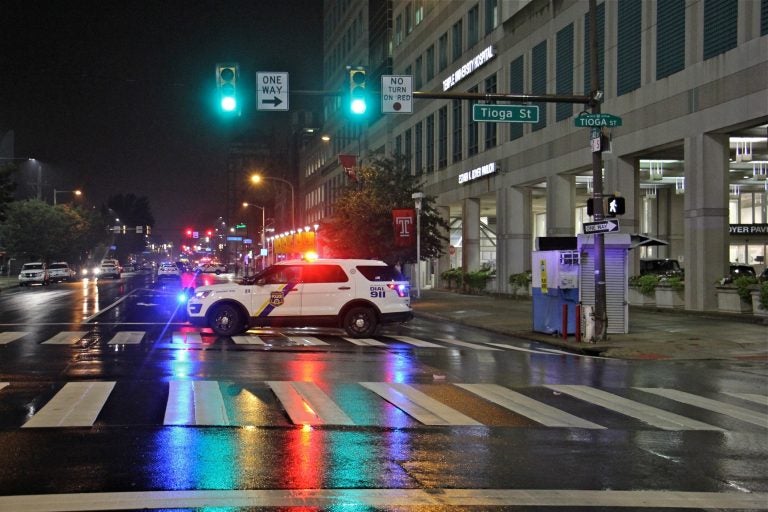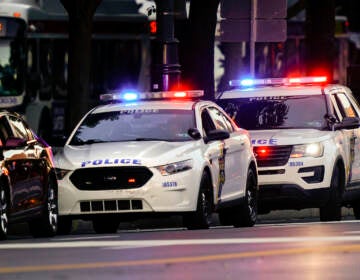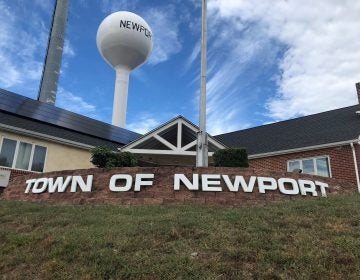Rules of the road: Car stops for minor traffic offenses will be off-limits in Philly
The goal of the new law is to reduce racial profiling and use police resources more efficiently.

Police stop traffic on Broad Street outside Temple University Hospital. (Emma Lee/WHYY)
Philadelphia police will soon be barred from stopping drivers solely for committing certain minor traffic violations, such as a broken brake light.
Starting Feb. 24, drivers who commit these violations can only be ticketed — and only if an officer has pulled them over for a more serious offense, such as blowing a stop sign or running a red light.
“We’re not going to be mailing tickets,” said Cpl. Jasmine Reilly, a spokesperson for the Philadelphia Police Department.
Signed into law in July, the new ban is rooted in recent data that shows Philadelphia police pull over a disproportionate number of Black drivers for minor traffic violations compared to white and Latino drivers. According to the same data, only a small percentage of these stops result in an officer confiscating any kind of contraband, including illegal guns.
Backers hope the “Driving Equality” law will help reduce racial profiling, but also maximize police resources by freeing up officers to enforce more serious violations. Believed to be the first municipal legislation of its kind, the measure was crafted in collaboration with Mayor Jim Kenney and Philadelphia Police Commissioner Danielle Outlaw, as well as the Defender Association of Philadelphia.
“We’re excited about moving in the direction of positivity and the direction of efficiency, while also looking to continue to improve the level of trust between communities of color and law enforcement because that working relationship is one that’s been damaged in the past,” said Councilmember Isaiah Thomas, who introduced the legislation in October 2020 and has personally experienced discrimination behind the wheel.
Under the new law, which takes effect following months of police department training, officers can still pull over drivers for what the measure calls primary violations — traffic offenses that can compromise public safety. These violations deal with how a driver operates their car.
Police will not be permitted to stop drivers if their only offense was committing what the law categorizes as a secondary violation.
- Secondary Violations (no traffic stop permitted)
- Late registration (with a sixty day grace period)
- Relocation of license plate (must be visible)
- Missing a single brake light
- Items hanging from the rear view mirror
- Minor Bumper issues
- Driving with an expired inspection sticker
- Driving with an expired emission sticker
“I know that some people will see this on the face and they’ll say, ‘Oh, this is ridiculous. This isn’t going to do anything. But they’ve not walked in the shoes of a person who’s been on the receiving end of it. And so while it may not be the be-all, end-all to end the type of interactions within our community that have plagued us for far too long, it is a step in the right direction. And for that, we should celebrate that part of it,” said Rev. Mark Tyler, who co-directs POWER Live Free.
David Fisher, president of Greater Philadelphia Chapter of the National Black Police Association, wholeheartedly disagrees. While he understands the intent of the law, he said the measure has too many negative consequences.
Fisher, who worked for the Philadelphia Police Department for 30 years, said criminals, such as gun traffickers, will be able to evade police in plain sight because officers will no longer have probable cause to pull drivers over for committing minor traffic violations.
The former detective also expects car insurance rates to rise in Philadelphia because there will be less incentive for people to have coverage because it’ll be less likely they’ll be pulled over and asked to show proof of insurance. To Fisher, that means that car accidents involving an uninsured driver will become more common in the city, which will lead to higher premiums for everyone.
“Of all the issues they’re having in Chicago, they ain’t got this ban. Of all the issues they’re having in Atlanta and New York, they don’t have this ban. There’s a whole lot of reasons, ways and things that I would love to be first at — not this ban. This is a bad ban with all good intent,” said Fisher.
A spokesperson for the Fraternal Order of Police Lodge 5 did not respond to a request for comment.
A separate, but related law requires the police department to track information related to car stops within city limits. The plan is to use that information to help evaluate the Driving Equality law.
WHYY is your source for fact-based, in-depth journalism and information. As a nonprofit organization, we rely on financial support from readers like you. Please give today.










